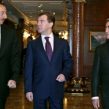
Armenia, Azerbaijan See Brighter Prospects For Karabakh Peace After Another Summit
Publication: Eurasia Daily Monitor Volume: 8 Issue: 60
By:

Armenia and Azerbaijan claim that the prospects for resolving their dispute over Karabakh have brightened as result of a fresh meeting by their presidents hosted by their Russian counterpart, Dmitry Medvedev. Each conflicting party claims that the other has adopted a more flexible stance that bodes well for decisive progress in their long-running negotiations.
The US, Russian and French diplomats co-chairing the Organization for Security and Cooperation in Europe (OSCE) Minsk Group, likewise spoke on March 17 of a “positive momentum” created by Medvedev’s March 5 meeting in Sochi with Armenia’s Serzh Sargsyan and Azerbaijan’s Ilham Aliyev. In a joint statement issued immediately after their latest tour of the conflict zone, the mediators urged the parties to “focus on the priority issues in order to make progress in reaching an agreement on the Basic Principles for Resolving the Karabakh Conflict” (www.osce.org).
The talks in Sochi were the eighth Armenian-Azerbaijani summit organized by Medvedev in the past three years – a fact underscoring Moscow’s central role in the Karabakh negotiating process. In a joint statement Medvedev, Aliyev and Sargsyan said such trilateral meetings “complement” the work of the Minsk Group co-chairs and will continue in the future. They said they agreed to “seek to resolve all contentious issues by peaceful means” (www.kremlin.ru, March 5)
The statement posted on the Kremlin’s website (www.kremlin.ru, March 5) said nothing about Baku’s and Yerevan’s outstanding differences on the “basic principles” proposed by the mediators, leading commentators to conclude that no substantive progress was made at Sochi. However, the subsequent public pronouncements by Armenian and Azerbaijani leaders suggest the opposite.
“One week ago I would have said that there are no results, no positive movement. But after the meeting in Sochi we can say there is certain progress in Azerbaijan’s position,” Sargsyan said on March 10, during an official visit to Latvia (Armenian Public Radio). Sargsyan told journalists on his return to Armenia that the “landmark” talks appear to have outlined “the path along which we can move forward” (Armenian Public Television, March 12).
Aliyev also indicated his satisfaction with the Sochi summit as he met with Switzerland’s visiting Foreign Minister, Micheline Calmy-Rey, on March 15. “I think that the Armenian side now understands more clearly than it did last year that the only way to establish peace and stability in the region is to start pulling out of [occupied] Azerbaijani territories,” Aliyev said (Azerbaijan Press Agency, March 15).
Aliyev’s chief foreign policy aide, Novruz Mammadov, told Trend news agency on March 7 that Armenia displayed a “slight positive change” in its position on the Karabakh conflict at the Sochi summit and that the next three months will show whether a breakthrough in the negotiations is possible. Yerevan was quick to deny any policy shifts, however, Deputy Foreign Minister Shavarsh Kocharian said that unlike Baku, the Armenian side has always largely accepted the proposed basic principles of a Karabakh settlement (Statement by the Armenian Foreign Ministry, March 8).
Azerbaijan’s leaders also claim to mostly agree with the framework peace accord that was formally presented to the parties in Madrid in late 2007 and has since undergone several modifications. Baku alleges that it is the Armenians that have been dragging their feet. The Madrid principles, still not publicized in full, call for the conflict’s phased resolution that would start with the gradual liberation of virtually all Azerbaijani districts around Karabakh that were occupied by Karabakh Armenian forces during the 1991-1994 war. In return, Karabakh’s predominantly ethnic Armenian population would be able to determine the disputed territory’s status in a referendum. Western and Armenian diplomatic sources privy to the peace process say the internationally supervised vote would enable the Karabakh Armenians to legitimize their secession from Azerbaijan.
The conflicting parties are thought to have disagreed on some key details of this peace formula such as the date of the Karabakh referendum and the timetable for Armenian troop withdrawal. It remains to be seen whether Medvedev indeed managed to persuade the Armenian and Azerbaijani leaders to narrow their differences on these and other sticking points. A follow-up meeting of the Armenian and Azerbaijani foreign ministers in the coming weeks would be a further indication of progress in the Russian mediation. The parties have yet to schedule such talks.
The Armenian-Azerbaijani disagreements might seem irreconcilable when one also looks at the parties’ public statements on how the Karabakh conflict should be resolved. Aliyev, for example, reiterated on March 15 that Baku could only grant Karabakh a high degree of autonomy within Azerbaijan, something which is a non-starter for Yerevan, let alone the Karabakh Armenians. Further progress in the peace process is also called into question by the continued deadly skirmishes along the main Armenian-Azerbaijani “line of contact” east and north of Karabakh. In their Sochi statement, Aliyev and Sargsyan pledged to strengthen the ceasefire regime there by jointly investigating such incidents along with OSCE representatives. Two Armenian soldiers and a nine year old resident of an Azerbaijani village close to the ceasefire line have been shot dead since then, sparking a fresh war of words between both sides.
One of the soldiers was reportedly killed on March 17, less than two hours after an Azerbaijani army officer captured by Karabakh Armenian forces last year was exchanged for an Armenian civilian in the same area (Haykakan Zhamanak, March 18). The exchange of all remaining prisoners of war and civilian detainees was another agreement reached by Aliyev and Sargsyan in Sochi.
The Minsk Group co-chairs expressed “deep concern” about these shootings before visiting Baku, Yerevan and the Karabakh capital Stepanakert on March 15-17. They said after the trip that they again urged the parties to withdraw snipers from their frontline positions. The Armenian side promptly reaffirmed its support for the idea which has been rejected by Azerbaijan until now.




